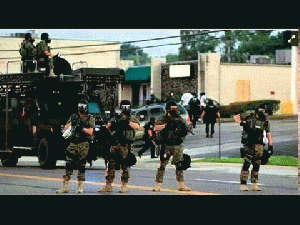Cross-posted from Campaign For America's Future
The transfer of used military equipment from the armed forces to police departments around the country has been accompanied, at least to a certain extent, by a shift in public thinking. The news media have played a critical part in that shift, both in its coverage and in what it chooses not to cover. How often do we hear, for example, statistics like these?
- From 1993 to 2012, overall violent victimization declined from a rate of 79.8 per 1,000 persons age 12 or older to 26.1 per 1,000.
- From 1993 to 2011, the rate of homicide declined 48%, from 9.9 to 5.1 homicides per 100,000 persons.
These figures are from the most recent Justice Department report on "criminal victimization," but we seldom hear them. Instead, news coverage reinforces frightening perceptions which are reinforced by a seemingly endless stream of violent imagery in popular culture and political rhetoric.
The weapons are coming.As several reports this past week have indicated, the transfer of weapons from the Pentagon to domestic police departments has been a driving force in the militarization of America's streets. As Zaid Jilani reports, Congress had a chance to stop that process when a bill co-sponsored by Dem. Alan Grayson, with the support of Republican Justin Amash, was introduced in the House. (The Democratic and Republican leadership voted against it, and it failed.)
The post-9/11 spike in national security spending has also added significantly to the militarization trend, as the Department of Homeland Security continues to dispense weaponry, eavesdropping equipment, and training to police departments around the country.
Who benefits?Who benefits from all of this? Defense contractors certainly do, since they can now argue that their products are useful to the nation both abroad and then at home. It also gives them new markets -- for direct sales to police forces, and for the sale of replacement parts, ammunition, and other supplies. There is a political benefit to be had for politicians whose ideology is based on fear.
This police-military complex moved into action during the heyday of the Occupy movement. A number of elected officials undoubtedly breathed a sigh of relief when the police's efforts against them finally splintered that movement (or drove it underground).
There's also benefit for the media. Sensationalism is good for business. In a disturbing segment which we first reviewed last year, 60 Minutes offered what amounted to an infomercial for the militarization of American police, in a segment entitled "Counterinsurgency Cops." What follows is adapted from our initial review:
*******
Counterinsurgency CopsThe 60 Minutes "Cops" episode featured footage of urban police in full military gear, carrying rifles with night scopes and kicking down the door of an American home. Lesley Stahl led the audience through a manipulative exercise which began with her telling the audience that foreign counterinsurgency casts soldiers as "warriors and community builders, going village to village driving out insurgents while winning the hearts and minds of the population" with 'mixed results at best."
And, Stahl continues, "we met a Green Beret who is finding out -- in his job as a police officer -- that the strategy might actually have a better chance of working, right here at home, in the USA."
The next paragraph in the official CBS script reads as follows:
"Call him and his fellow officers counterinsurgency cops! They're not fighting al Qaeda or the Taliban, but street gangs and drug dealers in one of the most crime ridden cities in New England."
That chirpy exclamation point is CBS's, by the way, not ours. CBS finds nothing controversial about fighting suspected gang members or drug dealers (legally they're only suspects, although the word is never used by Stahl) with the same techniques used to fight those who are presumably enemy combatants in a foreign field of battle.
(Note: You can view every article as one long page if you sign up as an Advocate Member, or higher).






